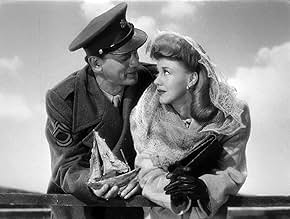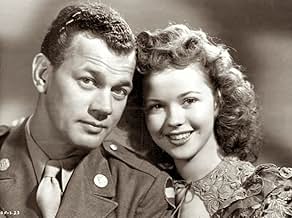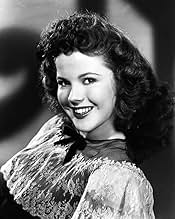Füge eine Handlung in deiner Sprache hinzuA soldier suffering from combat fatigue meets a young woman on Christmas furlough from prison and their mutual loneliness blossoms into romance.A soldier suffering from combat fatigue meets a young woman on Christmas furlough from prison and their mutual loneliness blossoms into romance.A soldier suffering from combat fatigue meets a young woman on Christmas furlough from prison and their mutual loneliness blossoms into romance.
- Regie
- Drehbuch
- Hauptbesetzung
- Lt. Bruce
- (as Dare Harris)
- Sidewalk Cowboy
- (Nicht genannt)
- Train Vendor (replaced by Olin Howland)
- (Nicht genannt)
- Minor Role
- (Nicht genannt)
- Mother of Boys
- (Nicht genannt)
- Counterman at Train Station
- (Nicht genannt)
- New Year's Eve Partygoer
- (Nicht genannt)
- Pine Hills YMCA Hotel Attendant
- (Nicht genannt)
- Franklin - Boy with Toy Machine Gun
- (Nicht genannt)
- Charlie Hartman
- (Nicht genannt)
- Sailor in Coffee Shop
- (Nicht genannt)
Empfohlene Bewertungen
Zach is suffering from what would be called PTSD today due to battle fatigue, and he's ashamed of that fact, afraid of winding up like the shell-shocked WWI soldier he knew as a boy.
Mary is a convict out on Christmas furlough, although what she is serving time for will probably be a shock to modern sensibilities - I know it was for me. She is also ashamed - understandably perhaps for being a convict, not so understandably for what she did to become one. I'll let you watch the movie and see what I'm talking about here.
Against this backdrop of people who feel badly for the positions they are in due to social mores of the 1940's - soldiers are always brave and good girls never get themselves into the position Mary got herself into, these two lonely people find each other and connect. At first Zach lies to Mary about his situation, but then tells her the truth. Mary chooses to keep the truth from Zach, partly because she loves him and doesn't want to lose him, but mainly because her company is making him well - he says her self-confidence is giving him confidence - and she doesn't want to set back his recovery.
Mary is staying with her aunt, uncle, and cousin during the holidays, and this warm family setting has both of them healing just a bit. Shirley Temple plays the cousin that is too young to know why Mary is in prison or wear lipstick according to her parents, but is apparently old enough to go out unchaperoned with a Lieutenant on leave who is probably five years older than she! Spring Byington plays the aunt who is supportive overall but still drops phrases from time to time that leave you wondering about the overall wisdom of her advise. For example, she keeps telling Mary to settle for second best and pretend it's first best - that's what she did!. Rather wacky advice by today's standards, but maybe mainstream feelings for people who married during the roaring twenties, and then raised a family during the depression and world war.
I highly recommend this sentimental favorite of mine. I'm rather surprised it hasn't become more of a Christmas standard, because even though in many ways it is a unique snapshot in time, the story of two lonely people finding each other in a world that would probably judge them severely if they were open about their problems is universal.
Interesting tidbits: Ginger Rogers was not the first choice for the leading role--it was originally offered to Joan Fontaine who disliked the script and was having contract troubles with Selznick and turned it down. Ginger was said to be against using Temple in the movie and wanted her removed since she had a clause in her contract re cast approval. Nevertheless, wiser heads prevailed and Shirley received excellent reviews for her contribution. Shirley documents this in her book, "Child Star"--for some reason Ginger took an instant dislike to her.
"I'll Be Seeing You" looks at the effects of a kind of `battle fatigue' known then as "old sergeant's syndrome". This particular form of post-traumatic stress occurred in battle-seasoned noncommissioned officers. After a dreadful encounter with someone's guard dog Sgt. Zachary Morgan, on leave from an Army mental hospital, experiences a very realistic and dramatically effective "flash back". Through judicious camera editing you see Joseph Cotton affect the appropriate 'sweat response', as his forehead, chest, shoulders and armpits become progressively more sweat-drenched. Very realistic!
This movie also subtly delivers the message that none of us are perfect and that open-mindedness and compassion are virtues called for under difficult circumstances.
Everyone else has outlined the plot, I'd just like to point out something really interesting. Ginger was around 33 when she made this movie playing a girl in her early twenties. And each time there's a close up of her face at Christmas, it's obvious the lens has been coated with vaseline or something... she looks softer and hazier than anyone else in the movie. "I'll Be Seeing You" is the epitome of old 1940's sentimental romances. And if you like that sort of thing, you'll love this one.
In this movie, people say their prayers, sing hymns, are respectful to one another, are considerate, etc. Unfortunately, they exhibit a trait that Hollywood has always loved to portray: they lie or, if you prefer, they cover up the truth. Here, Rogers does it, trying to hide her past while Cotten almost does the same, but comes clean early on.
Other than that, it's a throwback-to-the-more-wholesome-past film that, while it might be a bit slow in parts, features interesting lead characters by famous actors of their day: Joseph Cotten, Ginger Rogers and Shirley Temple. The latter is almost as entertaining as when she was the incredible child star but it was strange to see her in a role where she's trying to show off her chest! Yikes! Well, I guess you can't play a little kid forever.
Even though they were famous, Cotten and Rogers, I believe, were two of the most underrated actors of their day, particularly Rogers who was far more than just a great dancer.
Wusstest du schon
- WissenswertesDavid O. Selznick originally wanted to title this movie "I'll See You Again" and use the 1929 Noël Coward song of the same title as its theme music. However, he thought Coward wanted too much money for the use of the song and its title. Instead, Selznick acquired the rights to the 1938 song "I'll Be Seeing You," with music by Sammy Fain and lyrics by Irving Kahal. The emotionally powerful song was especially beloved during WWII when it became a sentimental anthem for British and American soldiers serving overseas.
- PatzerWhen Zach calls Mary the first time, and Mary invites him to dinner, she gives him the address and says, "Don't be late," but she never tells him what time he should arrive. However, he still manages to show up exactly on time for dinner.
- Zitate
Mary Marshall: [coming out of a theater showing a war movie] Is the war really like that?
Zachary Morgan: I guess so.
Mary Marshall: That's funny.
Zachary Morgan: Why?
Mary Marshall: I mean that you should only guess so.
Zachary Morgan: Well, they have experts making those pictures. I guess that's the way they see the war. A beach a mile long, and thousands of soldiers, and tanks, and machine guns and everything. I guess that's the way it is.
Mary Marshall: But it wasn't that way for you, huh?
Zachary Morgan: It's just a difference in size. To a guy that's in it, the war's about ten feet wide, and kind of empty. It's you and a couple of fellows in your company, maybe, and maybe a couple of Japs. It's all kind of mixed up. Sometimes it's all full of noise, and sometimes it's quiet. It all depends on what you're thinking about, I guess. It depends on how scared you are, how cold you are, and how wet you are. I guess if you asked a hundred guys what the war's like, they'd all give you a different answer. Mary. You know what?
Mary Marshall: What?
Zachary Morgan: I mean, usually you don't like to talk about it. I never said anything about it before, not to anybody.
Mary Marshall: I'm sorry, I ...
Zachary Morgan: No. No, I feel kind of good.
- VerbindungenFeatured in TCM Guest Programmer: Tony Bennett and Gary Sargent (2015)
Top-Auswahl
- How long is I'll Be Seeing You?Powered by Alexa
Details
- Erscheinungsdatum
- Herkunftsland
- Sprache
- Auch bekannt als
- Te volveré a ver
- Drehorte
- Produktionsfirmen
- Weitere beteiligte Unternehmen bei IMDbPro anzeigen
Box Office
- Budget
- 3.250.000 $ (geschätzt)
- Laufzeit1 Stunde 25 Minuten
- Farbe
- Seitenverhältnis
- 1.37 : 1
Zu dieser Seite beitragen



































